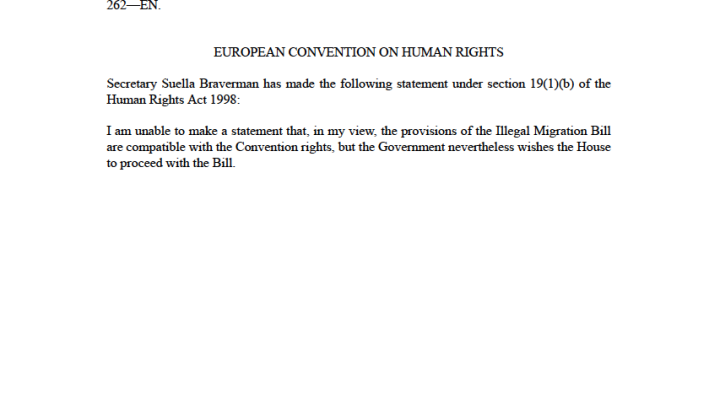Border Control as Politics
Posted
Time to read

This week’s publication in the UK of the Illegal Migration Bill heralds a new low in law in policy, and a disastrous step-change in the politicisation of borders in this country. While its terms and legality will be debated in Parliament and, no doubt, in the courts, the wider, political impact of this legislative bid, and the furore surrounding it, is already having an impact, by setting the terms and the tone of the debate. Moreover, while condemnation has been swift from within legal, academic, and activist circles, and from those who have sought asylum in the UK, as well as from some public figures, the British Labour Party has offered very little opposition.
For those of us working on border control and its effects, the government’s total disregard for the extensive legal and empirical evidence on the harms of detention, deportation, and asylum law is very difficult to manage. Under these circumstances, what role is there for academic research or expertise?
We do not have any easy answers to these questions. Rather like many others working across the field of migration, many of us at Border Criminologies feel overcome by current events. Yet, given the current absence of robust Parliamentary political opposition to this bill, and the growing influence of voices from the right, some of which come from within universities (particularly Oxford), we must find a way to regroup. It is not as though the bill was a surprise; the Tories have, for many years, been weaponizing the situation on the South Coast, experimenting and innovating with temporary and emergency responses, rather than looking for viable and ethical solutions for vulnerable people. Their policies, in any case, have been trialled and used elsewhere, most obviously in Australia. We knew it was coming.
So, what are some of the things we can do?
Here, there are a range of choices. First of all, as academics, we should not give up on the relevance of empirical evidence. That is a key role of academic researchers. So, even as research access becomes further constrained, and the impact of our work more tenuous, we must continue to insist on studying the system and its impacts in order to have material to challenge the politicisation of the border, or what, following de Genova, academics commonly refer to as the ‘border spectacle’. Second, like the government, we must be prepared to innovate, widening the scope of our research to imagine and work towards alternatives. Third, we need to reach out to others who have been managing similarly bleak political landscapes for longer, for example, in Australia, the US, and Greece, for insights, community, and reinforcement.
On some level, the first option feels the hardest at the moment. Insisting on details about government policy and how it will work in practice can appear to be uncritical, and at worst, risks co-optation; if we point out flaws and inconsistencies, do we risk the system adjusting and expanding in response? But, equally, failing to point out the contradictions and consequences that lie in the details, lets the government off the hook and maintains the rhetorical framework they prefer.
For example, one set of research-lead questions could demand clarification about how the bill will sit alongside existing practices and frameworks within detention. What about the ‘Adults at Risk’ policy, for example, brought in by an earlier Conservative government? However limited and problematic this policy may be, it has played an important role, not just in managing people identified as vulnerable in detention, as its critics point out, but in diverting them from this form of custody in the first place. An entire bureaucracy now exists around the decision to detain. Will that system not apply to this specific population? If so, what is it specifically about arriving by boat that alters the government’s previous legal, and supposedly moral commitment, to safeguarding vulnerable people? If they succeed in abandoning this commitment for this population, what will stop them from disregarding it for everyone else?
Similarly, where are people going to be detained? Given the low rate of deportation, and the difficulties of making legal agreements with third countries, how will people actually be removed? There is certainly not enough room in the seven Immigration Removal Centres, if the government’s estimated figures of who they seek to eject are to be believed. Nor does the last ten years of data on deportations and removals paint a system that could handle these numbers.
Already, instead, the media are talking of new detention camps. And clearly, there is desire among some of the current government to establish these. However, that is not always so easily done, as we saw at Linton-on-Ouse, and as already appears to be the case in Essex. Local communities are, in general, not particularly enthusiastic about such places being built nearby. The sites that are available, are, by definition, typically not fit for purpose, which is likely to lead to the same health and safety issues that have already occurred at Napier, and the death, from Diptheria, at Manston. Not to mention the cost of such endeavours to the taxpayer, already struggling to survive the post-Brexit cost of living crisis.
While members of the current government may be indifferent to such matters, recent events suggest that the employees of such places, who are typically from the very same local communities where these policies are enacted, are not. This aspect of border control – that it is a national policy made concrete in local places, is relevant for thinking about the kinds of approaches we take in our academic research. For, as we have seen at Manston, the Public and Commercial Services Union (who represent Border Force), and the Prison Officer Association who represent many of the private sector custody officers who staff the marquees, have, at least in part, broken with the Home Office in their pursuit of border control. These organisations may not be not obvious allies for people seeking asylum, yet, they have spoken out, and in the case of PCS, joined legal challenges against government policies. Is there a way of working more closely with these groups in responding to this new legislation?
For Brett Story and Judah Schept, writing in the context of US prisons, which are often built in deprived communities, wage labour “offers not only a site from which to understand the political work of the carceral state beyond punishment, but can also serve as an organizing platform across key struggles.” Or, to put it in another way that will be familiar to all the UK academics who have been regularly on strike over the past decade, labour conditions underpin what is socially and politically possible.
With some exceptions, UK scholars have not spent much time analysing border control as a job in its own right. Instead, quite understandably, they have spent most of their time focusing on those subject to border control. Yet there are multiple connections between hardening borders and the broader degradation of labour that has been both animated and intensified by globalisation and neoliberalism, and the limited opportunities in local communities where the British government is placing people in hotels, and detention camps. These connections might offer a way forward.
For one of the insidious effects of the border spectacle is that it obscures how illegalising people closes off better, alternative responses and possible futures. The adjacent airfield to Manston, for example, has been the subject of a longstanding application to reopen as a freight hub. The remainder of the site could have been turned into affordable housing with schools and local shops. Investment in roads, drains, and other forms of infrastructure might have kept some of the people who now work in the detention site, in the trades they had mastered, and allowed their children to live locally, while also expanding the capacity of the state to offer people seeking asylum homes and futures.
These are not impossible futures. And they do not necessarily require radical change. What they do need, however, is a refusal to be drawn into a zero-sum conversation about the UK and its borders. To build a world without harmful policies, we cannot work in silos. We can only do so in solidarity with each other. As academics committed to social change we can and should make strategic interventions collectively with the people and social movements we research. Our teaching and research should disrupt, discredit and dismantle these policies and instead open up possibilities for hope in what the future could look like.
Share
YOU MAY ALSO BE INTERESTED IN
With the support of









